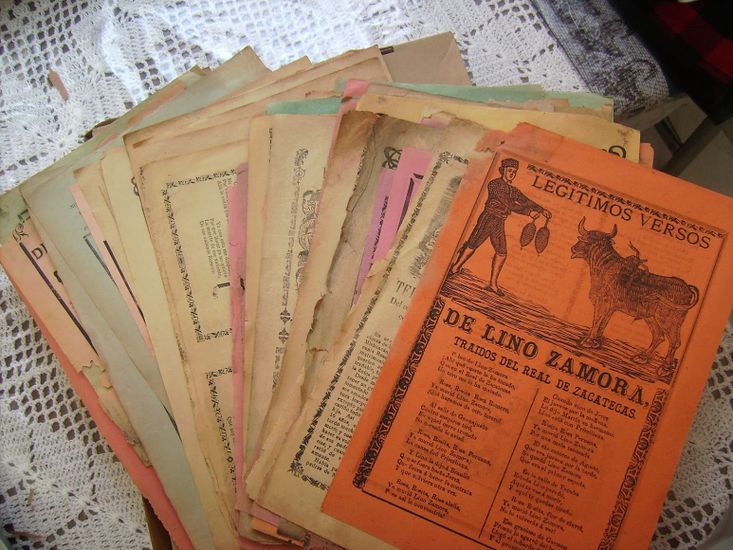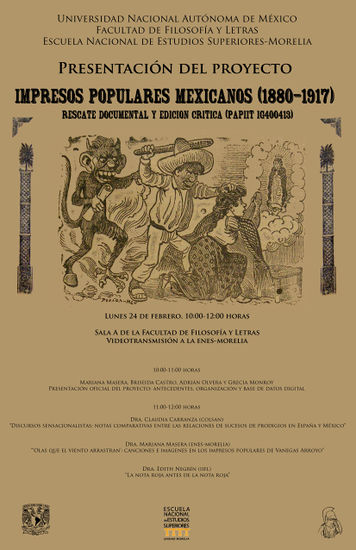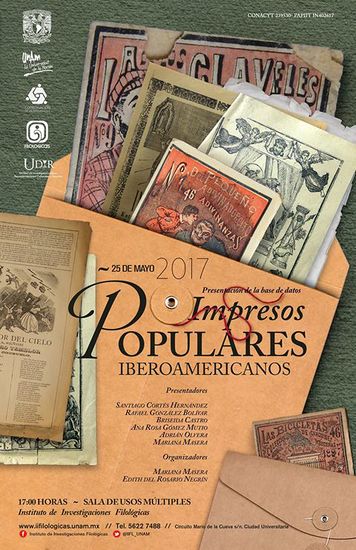About the Project
< Laboratorio de Culturas e Impresos Populares Iberoamericanos:Acerca deRevisión del 06:53 3 nov 2021 de Vaqalado (Discusión | contribuciones)
-
 The Laboratorio de Culturas e Impresos Populares Iberoamericanos (LACIPI), [Laboratory for Ibero-American Cultures and Popular Prints] is a trans-institutional working space for the multidisciplinary study of printed discourses of large-scale distribution as well as their various manifestations (sound, memory, gestures, corporality, devotions, musical expressions, among others). Its goal is to study printed popular literature from interdisciplinary vantage points in order to understand not only literary traditions, but also social dynamics, modes of circulation and communication, artistic manifestations, and cultural imageries.
The Laboratorio de Culturas e Impresos Populares Iberoamericanos (LACIPI), [Laboratory for Ibero-American Cultures and Popular Prints] is a trans-institutional working space for the multidisciplinary study of printed discourses of large-scale distribution as well as their various manifestations (sound, memory, gestures, corporality, devotions, musical expressions, among others). Its goal is to study printed popular literature from interdisciplinary vantage points in order to understand not only literary traditions, but also social dynamics, modes of circulation and communication, artistic manifestations, and cultural imageries.
 The main goal of this "wiki-style" web page is the digital classification of Ibero-American printed material from the beginning of the 19th to the first decades of the 20th century. The project emerged with two main objectives: firstly, the virtual restitution of the archives in order to preserve their content and make them available also outside the archives in which the physical exemplars are held; secondly, we are keen to provide a catalogue shaped like a virtual library to academics and the general public, with different indexes that allow to search by various relevant fields to differentiate the prints.
The main goal of this "wiki-style" web page is the digital classification of Ibero-American printed material from the beginning of the 19th to the first decades of the 20th century. The project emerged with two main objectives: firstly, the virtual restitution of the archives in order to preserve their content and make them available also outside the archives in which the physical exemplars are held; secondly, we are keen to provide a catalogue shaped like a virtual library to academics and the general public, with different indexes that allow to search by various relevant fields to differentiate the prints. -
As a result of the first two working phases, in May 2017 the database was opened for public inquiry and presents the family documents of the Vanegas Arroyo archive online, as well as its activity in Mexico from 1880 to 1917 and those of the publisher’s testamentary, which reaches the decade of 1940.
The third phase began in 2015, when other popular prints of various formats stemming from different national and foreign archives were added to our collection. These items are preserved in repositories as part of the collections published by don Antonio Vanegas, or that gave continuity to the publishing project built by him during the existence of the testamentary press. These items greatly help completing the documents digitised in the second phase, an example of which is the collaboration with the Ibero-American Institute of Berlin, given its rich collection, among others, of Jose Guadalupe Posada’s graphic artwork.
Prints by other printing presses will be digitised by means of inter-institutional collaboration, or will be added to the website having been digitised previously. The idea is to keep them in a single database in order to provide the possibility to study the poetics, stylistics, graphics, and editorial craft of popular Pan-Hispanic and Ibero-American printed literature of the 19th and early 20th centuries. This is, therefore, a proposal for constantly-updated collaborative work in order to allow different teams to connect and provide an easier search for the users.
-
-
Contenido
First Phase: 2009-2012
In a first phase, without funds, the project started in the Instituto de Investigaciones Filológicas of the UNAM with the aim of studying the manifestations of popular literature through printed material for the period spanning from the early 19th to the first decades of the 20th century.
Second Phase: 2012-2014
The second phase was carried out with the support of the Dirección General de Asuntos del Personal Académico (UNAM) through the PAPIIT (IG4004139) project called Impresos Populares Mexicanos (1880-1917) rescate documental y edición crítica; among the goals of the project were the digitalisation, classification, and study of the prints of the Vanegas Arroyo Press. The database was built, workshops and courses were organised, a book was published with the participation of several scholars, one dissertation was produced, as well as a colloquium titled “Notable Suceso: Primer Coloquio de Impresos Mexicanos (1880-1917)”.
-
-
Third Phase: 2015-2018
The third phase was carried out with the support of CONACYT (239530-H) during the 2015-2018 period: Los impresos populares mexicanos de la Nueva España al México independiente (1800-1917): rescate y edición crítica, The aim is to continue with the development of the relational complex database with which we carry out the classification, the systematisation, the rescue, and the publication of popular prints of different sources and popular presses of the period between the 18th and the early 20th century. During this phase, the database is enlarged, various articles are published, as well as book chapters, and two dissertations. A second Coloquio de Impresos Populares was held, dedicated to Vanegas Arroyo, for the centenary of his death. This was celebrated from 13 to 15 November 2017 at UNAM. All of this will be shared on this website.
During this same phase, 2016-2018, the project received the support of the Dirección General de Asuntos del Personal Académico (UNAM) through a PAPIIT (IN402617) project to continue and enlarge the digital catalogue of popular prints, especially from the Vanegas Arroyo Press, as well as prints from various national and foreign archives. With this support, it is possible to continue with the digitalisation, publication, and study of the texts and images of popular prints of literary character that mean a fundamental input for the understanding of printed popular literature and the Mexican culture of the 19th and early 20th century. Courses will be held, and articles, dissertations and other texts will be produced and shared. Regrading this phase, the following books can be consulted:
Masera, M. (2017). Colección Chávez Cedeño. Antonio Vanegas Arroyo: un editor extraordinario México: UNAM, 2017, 176. pp. ISBN: 978-607-30-00040-6
Masera, M. (2018). Las representaciones de la voz en la literatura del cordel de Vanegas Arroyo (siglos XIX-XX). Cuaderno de la Coordinación de Humanidades.
-
Fourth Phase: 2018-2020
With the support of the Dirección General de Asuntos del Personal Académico (UNAM) through the PAPIIT (IG400519) project and in collaboration with the working team of Poética Sonora, the project “Materialidades de la voz: archivos, impresos y sonido” was carried out. This project was directed towards the interdisciplinary research for the rescue, preservation, classification, and study of hybrid material (linked to voice, sound, image, and text) on ephemeral supports, both from Mexico and Latin America’s popular culture as from the contemporary sound culture. See seminaries: Orality: Archive and Sound y Orality: memory and Resonance.
|
|









